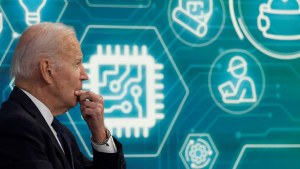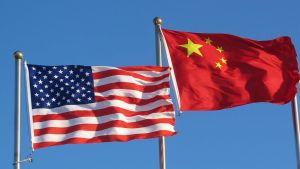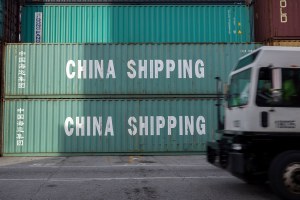The public generally does not see current US trade policies toward China as benefiting Americans.
The 2023 Chicago Council Survey, conducted September 7–18, 2023, finds Americans concerned about the relative economic power of the US and China, with most saying the US has not done enough on trade and economic issues in the US-China relationship.
Key Findings
- A quarter of Americans (23%) identify China’s economic power as their greatest concern about China.
- Americans say the United States has not gone far enough in responding to China on intellectual property theft (65%), economic competition (52%), and China’s role in global supply chains (49%).
- Pluralities of Americans view US trade policies toward China as being bad for creating US jobs (48%), for the US economy (47%), for American companies operating in China (45%), and for US national security (43%).
- Majorities of Republicans view US-China trade policy as being bad for nearly all areas asked about, while Democrats are more divided.
- The public is divided over whether the United States (33%) or China (32%) is the stronger economic power; another third (33%) say the two are tied.
Americans Split on Whether US, China the Stronger Economic Power
American concerns about China have long included trade issues. Since 2002, a majority of Americans have consistently viewed China as an unfair trading partner. More recently, Americans have come to view China’s economic power as a critical threat to the United States: 50 percent in a March 2021 Council survey, up from just 31 percent in 2018.
While US-China competition has expanded to include other realms, the economic component remains a prominent factor in Americans’ minds. As the 2023 Survey finds, a quarter of Americans (23%) identify China’s economic power as their greatest concern about China. The public is also divided over whether the US (33%) or China (32%) is the stronger economic power, with an additional third (33%) viewing the two nations as equally matched economically.
Many Say US Government Has Not Done Enough on US-China Issues
Concerns about China’s growing economic strength, and views of US-China trade as damaging to US national security, have led many Americans to support policies aimed at reducing the exchange of goods and technologies between the United States and China. In the 2021 Chicago Council Survey, majorities favored increased tariffs on Chinese goods (62%), significant reductions in bilateral trade even if that came at a cost to US consumers (57%), and restrictions on the exchange of scientific research between the US and China (52%).
However, Americans today do not believe the US government’s response to China on trade and investment issues has gone far enough. Two-thirds (65%) say the US has not gone far enough in responding to the theft of US intellectual property by Chinese companies. A majority (52%) says the same about economic competition with China more broadly, and a plurality (49%) says the US has not gone far enough in dealing with China’s role in global supply chains.
US-China Trade Policies Not Seen as Good for US Economy or Security
In addition to not going far enough in responding to China, Americans generally do not see current US trade policies toward China as benefiting Americans. Instead, a plurality of Americans view US trade policies toward China as bad for creating US jobs (48%), for the US economy (47%), for American companies operating in China (45%), and for US national security (43%). The public is split over whether those policies are bad (40%) or good (38%) for prices for US consumers, with an additional 17 percent saying they have no effect either way. The only group which a plurality of Americans see as benefiting from US trade policies toward China are American companies without operations in China (37% good), though many also see US policy as having no effect for them (30%) or being bad for them (27%).
Across issue areas, Republicans are considerably more likely than Democrats or Independents to say current US policies are bad for the United States. Majorities of Republicans view current trade policies as bad for the US economy (61%), job creation (58%), national security (57%), and American companies operating in China (57%), and half (51%) say they negatively impact prices for US consumers. The only area where more Republicans say US policies are good than bad is for American companies not operating in China (42% good, 34% bad, 20% no effect).
Democrats are generally more divided on the impacts of US-China trade policies. Between a third and four in 10 view US policies as either good or bad for US consumer prices, the US economy, US job creation, and US national security. The exceptions to this pattern of divided opinion are both on the impact on American companies: a plurality say US trade policies are good for companies not operating in China (41%), and a similar plurality say they are bad for companies not operating in China (40%).
Public Opposes Buying Semiconductor Chips from China
Matching Americans’ generally negative views toward trade with China, the public across party lines opposes the idea of using China as a source for semiconductor chips (69%, 29% support). Instead, most Americans prefer to subsidize American production (82%) or to purchase chips made in friendly countries such as Germany or Taiwan (80%). That stance holds across party liens, with majorities of Republicans, Democrats, and Independents all opposed to sourcing chips from China and instead supporting onshoring or friendshoring approaches to semiconductors.
This analysis is based on data from the 2023 Chicago Council Survey of the American public on foreign policy, a project of the Lester Crown Center on US Foreign Policy. The 2023 Chicago Council Survey was conducted September 7-18, 2023 by Ipsos using its large-scale nationwide online research panel, KnowledgePanel, in both English and Spanish among a weighted national sample of 3,242 adults aged 18 or older living in all 50 US states and the District of Columbia. The margin of sampling error for the full sample is ±2.0 percentage points including a design effect of 1.2908. The margin of error is higher for partisan subgroups or for partial-sample items.
Partisan identification is based on how respondents answered a standard partisan self-identification question: “Generally speaking, do you think of yourself as a Republican, a Democrat, an Independent, or what?”
The 2023 Chicago Council Survey is made possible by the generous support of the Crown family, the Korea Foundation, and the United States-Japan Foundation.


Related Content
 Public Opinion
Public Opinion
While the US public believes trade is good for the economy, it does favors some restrictions—especially on goods such as semiconductors.
 Tech and Science
Tech and Science
Why microchips are at the heart of the geopolitical contest between the US and China.
 Global Economy
Global Economy
According to foreign policy leader surveys concerns about a potential trade war between the US and China are widespread.




